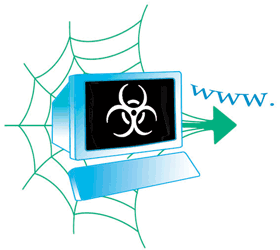|
Monsanto's World Wide Web of
Deceit
THE GM WAR OF WORDS Letters, The Guardian, Tuesday
20 May 2002
The editor of Nature, Philip Campbell,
can't get away with claiming that his disowning of a paper on GM maize
contamination in Mexico published in his journal had nothing to do with
the
hate campaign waged against its authors (Letters, May 15 ).
Campbell's assertion that this
unprecedented step was prompted purely by the paper's technical deficiencies
fails to explain not only the paper's successful completion of Nature's
stringent peer review process in the first place, but also why only one
of three reviewers of the subsequent exchanges between the paper's critics
and its authors called for its retraction.
In the past Campbell has editorialised
against an "industrial-biotechnology complex out of control". The tracks
of this runaway juggernaut now run right across the editorial pages of
his own journal.
Jonathan
Matthews
GM: And yet it moves Letters, The Guardian, Friday 24
May 2002
From his position as editor of
Nature, Philip Campbell has provided the world with measured and intelligent
leadership in biology, at a time of radical transformations in our discipline.
It is puzzling that he would have chosen to side with a vociferous minority
in obfuscating the reality of the contamination of one of the world's main
crops with transgenic DNA of industrial origin (Letters, May 15).
Perhaps the key lies in his tacit
acknowledgment, albeit by dismissal, of the enormous pressures on anyone
working in or around the biological sciences ever since we were set on
a collision course with commercial interests. He is right in pointing out
that modern science should not be - and is not normally - carried out through
the obscurantist practices exposed by George Monbiot (The
fake persuaders, May 14). But Philip Campbell's participation, however
reluctant, in these practices seems to be further evidence of the insidious
challenges facing open discourse in biology.
Our discovery of transgenic DNA in Mexican landraces of maize has never been seriously challenged and continues to be confirmed. There is no legitimate reason why we should have acquiesced in Nature's insinuations for a retraction, or why Nature should have taken the unprecedented measure of unilaterally withdrawing its support for our paper, which its own peer-review system recognised as valid and important. Neither of the two letters published
by Nature, purportedly showing fatal flaws in our paper, ever questioned
our main discovery. All results to date from our laboratory, as well as
those from independent studies using a variety of methods, continue to
support our statements (Mexico's vital gene reservoir polluted by modified
maize, April 19). It is perplexing that Nature would have chosen to side
with the opinion of a single critic, against the concordant indications
of a tandem of independent reviewers appointed by the journal itself, and
against all empirical evidence.
Science has progressed in modern
times by the presentation of results which are subsequently refined or
rectified by further empirical work. As Nature well knows, the self-perpetuating
genetic contamination of our crops will remain as an undeniable ecological
reality for others to confirm. But will we, as a society, have the independent,
public infrastructure to confront this and other similar challenges derived
from our transformation of the biosphere?
The coordinated attempt to discredit our discoveries in the public piazza sends a chilling message to those who would dare ask important but uncomfortable questions and find their truthful answers. It is an assault on the very foundation of science. Against those who would like to
bury from public view the reality of the uncontrolled movement of transgenic
DNA in the environment, I can only echo the words of Galileo: "Eppur si
muove" [And yet it moves].
Ignacio H Chapela
|
 |
||||
|
SPIKED!
Letters, The Guardian, Wednesday
15 May 2002
George Monbiot wrongly states that
I was forced to withdraw our endorsement of a paper that we had published
by a campaign of character assassination against the authors (The
fake persuaders, May 14).
The retraction was necessitated
by technical flaws in the paper that came to our attention after its publication
(which we should have picked up), and by the authors' decision not to retract
the paper themselves. Our decision to make the statement had nothing to
do with the fact that the paper was about genetic modification. It must
have been Murphy's law that ensured that our technical oversight, embarrassing
in itself, was in relation to a paper about one of the most hotly debated
technologies of our time.
Philip Campbell
|
|||||